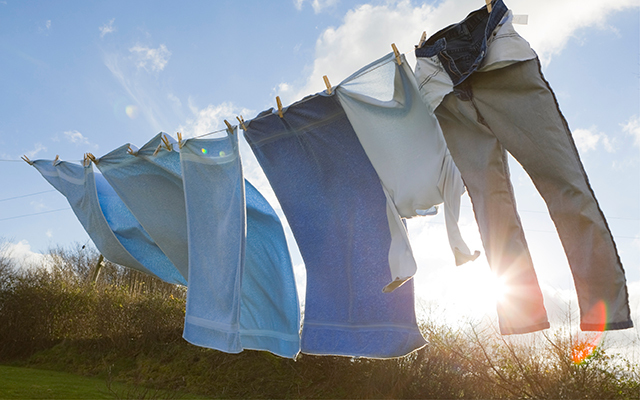It’s one of the most durable memories from my 1950s childhood: I’m standing next to the convulsing old washing machine in the musty basement of our house and catching the damp, flattened clothes as they come through the wringer. Mom is there, of course, feeding the shirts, pants, underwear, and socks through the rollers while making sure I keep my fingers out of harm’s way. She then lugs the basket of soggy clothes out to the backyard clothesline where I hand her the wooden pins that secure them to the line. Our collaboration never failed to make me feel as if I were somehow a contributing member of the family. Mom, I suspect, simply wondered whether someday she’d have a modern washer and dryer.
She got her wish a few years later (courtesy of a newly acquired Sears Roebuck credit card), and though she would never confide such a thing to her youngest son, I’ll bet she felt her family had finally arrived. There was central heating, after all, and indoor plumbing, a gas stove and electric refrigerator, a telephone (though we shared the line with a neighbor), and a stainless-steel toaster. For her and Dad, Depression-era kids raised on hardscrabble prairie farms, it must’ve seemed like they were living on Easy Street.
I’ve been thinking recently about Mom’s wringer washer and the whole idea of household conveniences after stumbling upon a piece Tim Wu penned in the New York Times. The Columbia law professor and author of The Attention Merchants: The Epic Struggle to Get Inside Our Heads makes a compelling case that efficiency and ease “has emerged as perhaps the most powerful force shaping our individual lives and our economies.” This cult of convenience tends to encourage conformity, he argues, and diminish purpose. And, while he doesn’t focus his argument primarily in generational terms, I can’t help but think it carries special meaning for those of us navigating the rocky landscape here in Geezerville.
Wu isn’t arguing that we should all toss our smartphones and head for some shack in the deep woods. And he certainly wouldn’t begrudge my mother her washer and dryer. He’s simply suggesting that we avoid always embracing the latest convenience without considering its liabilities. “Making things easier isn’t wicked. On the contrary, it often opens up possibilities that once seemed too onerous to contemplate, and it typically makes life less arduous, especially for those most vulnerable to life’s drudgeries,” he writes. “But we err in presuming convenience is always good, for it has a complex relationship with other ideals that we hold dear.”
The mid-20th century conveniences that so dazzled my mother were considered slightly utopian, Wu explains. They were designed to free the working classes (especially its women) from the dawn-to-dusk duties that kept them from cultivating more uplifting pursuits. The results, at least according to some social critics, were decidedly mixed. Betty Friedan in her 1963 classic, The Feminine Mystique, famously argued that housewives simply filled their newly liberated hours by finding more “easy” household tasks. After she retired her old wringer washer, for example, Mom washed and waxed the kitchen floor once a week without fail.
But Wu saves his most scathing criticism for more recent — and, he argues, less practical — conveniences: the playlist, social-media platforms, and the like. “If the first convenience revolution promised to make life and work easier for you, the second promised to make it easier to be you,” he writes. “The new technologies were catalysts of selfhood. They conferred efficiency on self-expression.”
This efficiency, though, comes at a cost. Identity becomes homogenized; life becomes more about outcome than process. Facebook, for instance, is a convenient way to stay in touch with friends and family, Wu admits, but the platform’s format and operating conventions tend to remove all but the most superficial aspects of a user’s personality. Meanwhile, the ease with which we’re now able to search for information and order up everything from transportation and takeout to concert tickets and sneakers, he says, diminishes our quality of life.
“Being a person is only partly about having and exercising choices,” he explains. “It is also about how we face up to situations that are thrust upon us, about overcoming worthy challenges and finishing difficult tasks — the struggles that help make us who we are. What happens to human experience when so many obstacles and impediments and requirements and preparations have been removed?”
Older folks generally don’t spend much time worrying about a lack of challenges, so Wu’s prescription — embracing inconvenience — isn’t likely to require major lifestyle changes among my geezer cohort. Growing old is inconvenient: The body rebels, the mind betrays. And clinging to a belief that it should somehow be otherwise is to simply invite anxiety and frustration.
It may, in fact, be among the elderly where we can best observe Wu’s edict in action. Every day, armies of retirees fan out across the country to engage in the world, despite the inconveniences placed in their way by a youth-dominated society and their own infirmities. They volunteer in soup kitchens and churches, schools and parks when they’re not attending to grandkids or driving a friend to a doctor’s appointment. None of this is easy, but it’s essential to a satisfying life.
“Such activities take time, but they also give us time back,” Wu argues. “They expose us to the risk of frustration and failure, but they also can teach us something about the world and our place in it.”
My dad wasn’t the volunteering type, but his all-too-brief retirement featured a handful of surprising activities. He created a few pieces of what was then known as “string art,” took up golfing, and somehow convinced Mom that he could handle the laundry in a more efficient manner.
On wash days, he’d invade the laundry room with the kind of single-minded determination he seldom exhibited in public, employing what to the casual observer probably seemed like a vaguely mysterious obsession with streamlining a task that technology had already greatly simplified. I was out on my own by then and grappling with my own mysteries, so I never really discovered what Mom thought about the whole thing. And Dad never let on, of course, but I came to believe he may have grown more attached to that washer and dryer than she had.




This Post Has 0 Comments